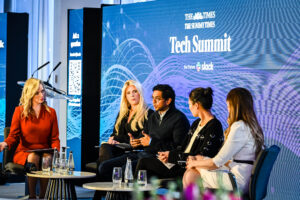The much-dreaded phrase "inevitable recession" is beginning to dominate the news cycle and most of the nation grapples with the prospect of being significantly worse-off financially this winter.
Brands, too, face a daunting challenge - how do you provide genuine support and add value to consumers' lives at a time when discretionary spending is under heavy review?
Evidence from previous periods of austerity shows that, for those able to do this, the potential rewards are immense. But being successful requires a deep understanding of the needs and motivations of consumers during this time.
With this in mind, here are the three prevailing need states we are observing among our audiences and the public at large.
1. Everyday advice
In turbulent times, consumers seek orientation and calibration from trusted sources.
We don't have to cast our minds back far to recall evidence of this. Following COVID-19 lockdowns, two thirds of Brits and 77% of those under 35 acknowledged that: "I appreciate and value journalism more since the coronavirus pandemic".
Now, amid fear and uncertainty of a different kind, the nation is again looking to these sources for guidance. In addition to broad updates on the cost of living crisis, what our audience are looking for most is "Practical tips for personal finance", as they attempt to make their household budgets stretch further.
Our most recent reader and listener panels reveal that the majority of our audiences have set a strict budget in response to the cost of living crisis, or are planning to do so.
With less than a quarter of the Brits believing that the government has the right ideas when it comes to dealing with the crisis, pragmatic advice from money-saving experts - like '17 Ways to Cut the Cost of Your Food Bill' or '30 Ways to Boost Your Income with Easy Side Hustles' - are perceived to be far more helpful than politicians suggesting that they invest £20 in a new kettle.
2. Everyday escape
When the realities of life seem grim, consumers look to entertainment for escapism.
By means of example, our audience increased consumption of films and high-production drama (as well as TV in general) throughout the pandemic, and we saw a nostalgia boom.
Our cost of living reader panel reveals that, while many households are reviewing all discretionary spending, they are far more likely to be cutting back on "going out" or "clothing" than everyday sources of entertainment like "hobbies" and "TV subscriptions".
One consequence of a depressing news cycle is that audiences become more attuned to compartmentalising their conflicting needs to remain in-the-know and get away from it all.
More than half of Sun & Times readers agree that: "I enjoy using my leisure time to escape from reality". Respectively, they are 22% and 14% more likely to do so.
Often, this escape will come in the form of scrolling through The Sun Showbiz section on a weeknight evening, a long read of The Sunday Times Magazine or unwinding with Graham Norton on Virgin Radio or GameDay on talkSPORT.
In this environment, reading the room, leveraging contextual relevance and pulling the right emotional levers to help facilitate this escape become even more important.
3. Everyday celebration
Difficult economic conditions increase the value of small rewards and indulgences.
‘The lipstick effect’ is the textbook example of this and, while its validity is often questioned, lipstick sales are up 48% YoY in the first-quarter of 2022; outperforming the beauty category overall.
An increased focus on mental health since the pandemic has reframed self-care from an indulgence to a necessity, strengthening the allure of the ‘Everyday Celebration’.
Almost seven in 10 Brits indicate that they are prioritising their overall wellbeing more now than 12 months ago, with 64% “Finding more time to enjoy today”.
In this context, and with value at the forefront of consumers’ minds, brands that can provide an affordable endorphin release have strong appeal.
Similarly, the importance placed on sharing experiences with friends and family is another enduring legacy of COVID-19 lockdowns.
This is especially the case among our Sun and Times audiences, who are 33% and 16% more likely, respectively, to agree that: “I love any excuse to have a celebration”.
While the upcoming Christmas season has more than half of the nation anxious about its cost, the fact that it coincides with the FIFA World Cup means that many will be planning smaller, regular celebrations in the lead-up.
Brands can win the occasion by helping facilitate the connection and joy that these gatherings provide, irrespective of their extravagance.
Build for the future
Those that resist the urge to go dark and instead "invest in creativity" just just stand to benefit not just from increased share and relevance in the short-term.
They can also build brand health when the cultural and economic context improves.
After all, it's less than 12 months since much of the nation was basking in the first glimpses of post-pandemic liberation, millions were counting their accidental savings and marketers were contemplating how to approach "the new roaring twenties".



 News UK
News UK 






